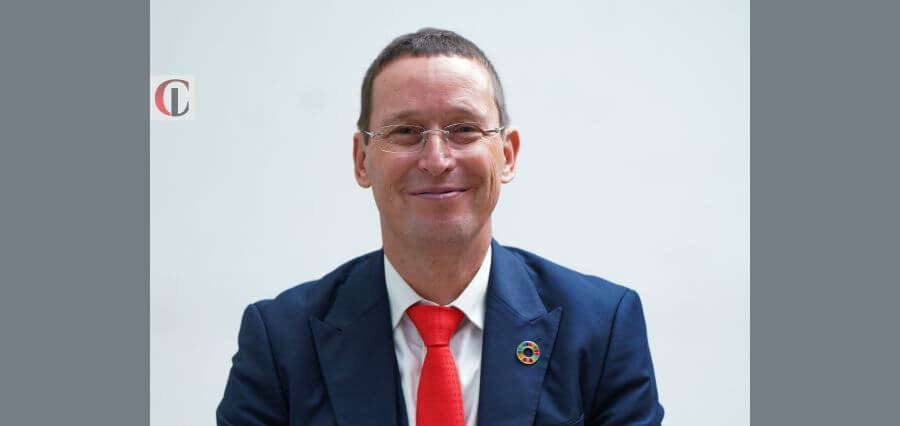Philippe Vogeleer is a senior executive specializing in shaping the future, notably via investment partnerships between corporations, governments and international organizations. Originally a lawyer who retrained in technology, business and media. Philippe gradually moved from advising businesses as a consultant for Deloitte to running OpCo as an executive for Orange and Ooredoo to delivering strategy for a major HoldCo.
Philippe has been managing the BusDev activities of Vodafone Group since 2018. Positioned as Group Head of Business Development, he and his team have focused their attention on creating investment partnerships with large corporations such as Sumitomo Corporation; public authorities in Europe, in the Middle East, and in Africa; as well as international organizations such as British International Investment (BII), the European Investment Bank (EIB), World Bank Group (WBG), US Development Finance Corporation (DFC), and USAID.
In 2021, Philippe and his peers at Vodacom, Safaricom, Sumitomo, and BII secured a license to launch an innovative network, integrating terrestrial mobile and low-orbit satellite technologies in Ethiopia, an African country of 120 million people three and a half times the size of Germany. This ambitious venture highlighted the effectiveness of collaboration, prompting the realization that faster development could be achieved through repeated partnerships. Recognizing the potential, the World Bank Group joined this global development partnership in 2023.
Let’s explore how Philippe is bridging the digital gap and creating a future where technology is a bridge, not a barrier!
The Digital Revolution
In his 25-year tech journey, Philippe has been a witness to the transformative power of the digital realm. He reflects on the vast potential it holds to drive progress towards the United Nations’ Sustainable Development Goals (SDGs). “The clock is ticking,” Philippe notes, “our industry has shown that digital can literally change the world to make it a better place for billions of people”. However “we’re halfway through the SDGs timeline, and only 15% of them are on track.”
Addressing the urgency, Philippe draws a parallel to sportsmanship, emphasizing that the game is not over until it is over. Frustration is not the solution, instead he advocates for persistent effort. “Complaining doesn’t help. We need to keep pushing until we deliver, together.”
Philippe recognizes the unanimous agreement among economic and political stakeholders regarding the pivotal role of digitization. “Digitizing activities such as financial services, agriculture, education, government services, or healthcare is the only way to provide access to millions of people otherwise deprived of access to these services,” he asserts. This, he believes, is “the” democratic challenge of our times—ensuring that the entire population, not just a privileged few, becomes part of the digital revolution.
The challenge extends beyond emerging markets, as Philippe points out, citing the global impact of the COVID-19 pandemic. “Many people in so-called richer countries are still deprived of access to life-changing digital services as are many people in so-called poorer countries,” he observes. The barriers include a lack of hardware to get access to such digital services, and training to use those services. However, Philippe is optimistic, noting that the necessary technology already exists and can significantly contribute to at least 8 of the 17 SDGs.
“We have the data—we know what works and what doesn’t. Now, we need to scale this knowledge,” Philippe urges. He emphasizes the importance of collaboration, echoing the sentiment of the World Bank Group President, Ajay Banga, to “replicate with pride.” The goal is to ensure that the majority of each country’s population is not only aware of these services but also has easy access and knows how to utilize them.
Philippe acknowledges the contributions of partners, colleagues and thousands of committed individuals. He highlights the importance of recognition in advancing the mission of making the world a better place through the dissemination of affordable, life-improving technologies.
From Solo Efforts to Global Impact
In the landscape of tech discussions—low orbit satellites, quantum computing and AI—Philippe draws attention to a stark reality, “2.7 billion people lack basic internet access, hindering progress towards universal high-speed internet by 2030, requiring a hefty $418 billion investment per year to deliver.” Against this backdrop, he underscores a demographic shift, “50% of the world’s youth will soon hail from Africa, emphasizing the urgency to impart digital literacy for a globally connected future.”
Acknowledging efforts, Philippe constructively critiques the current pace, stating, “Investment and speed of delivery fall short despite substantial digital earmarks.” He posits a compelling argument, “Many in the ecosystem work solo, reinventing the wheel and confining efforts to controllable zones.” His call is clear—to overcome this inertia, “List what works, define what’s replicable and create systems for swift implementation globally, one country after another.”
Philippe sees a collaborative solution, emphasizing, “Different groups worldwide must unite for development.” His vision extends beyond monetary commitments, urging, “Speed matters, replication matters, ensuring access for all matters.” Philippe’s passionate plea echoes for a collective shift, “It’s time to break silos, learn from success and accelerate together. The digital future demands a united effort to empower every corner of the globe, bridging the gap and ensuring a technologically literate generation.”
Data Dynamics
Unlocking the full potential of the digital realm requires addressing five interconnected layers simultaneously; as Philippe emphasizes, “Basic infrastructure such as fiber optics and towers , green energy, accessible devices, value-added services, and robust data centers.”
Philippe offers a tangible illustration, “In the last 15 years, data generated by the average European telecom user has multiplied by approximately 75 times.” This surge, he notes, necessitates ongoing adaptation of the ecosystem to accommodate the escalating data volumes. This in itself requires funding and skills, which should be brought by the various beneficiaries: corporates; public authorities; and international organisations.
The call is clear—to create flourishing digital ecosystems worldwide: “We must build not just one layer but all five concurrently, ensuring infrastructure, energy, devices, services, and data management evolve hand in hand.” In this synchronicity lies the key to harnessing the vast potential of the digital age for the betterment of lives globally.
Joining Forces
In the realm of building digital ecosystems, Philippe stresses that it’s a collaborative effort, “Partnerships are the future of our industry; the task is gigantic and it can’t be done by one party alone.” He advocates a pragmatic approach, “Working with trusted partners on a recurring basis, simplifying and replicating standardised models—what I call ‘financial plumbing‘—accelerates these partnership processes.”
The exemplar of this approach is the Global Partnership for Ethiopia—Vodafone, Vodacom, Safaricom, Sumitomo, BII, WBG, AST SpaceMobile, and 75 local companies unite for an $8.5bn project, transforming key sectors to achieve 8 of 17 SDGs. Certainly not an easy project to land and deliver. Philippe lauds the success of strong partnerships, prompting a global extension, “Replicating this framework globally allows companies accustomed to collaboration to work on the five pillars of digital in various countries. It’s not simple, but possibly the only way to deliver projects fast and at scale.”
The invitation is open, “Further partners are welcome to join.” In this shared endeavor, Philippe envisions a future where collaborative efforts on a global scale become the cornerstone for realizing the potential of digital transformation.
From Challenges to Opportunities
Looking again at the 5 Layers of Digital—it is quite clear that investment in infrastructure such as mobile towers, fiber optic cables, data centers, and power plants have been the key focus in the past while two other layers are still particularly underserved. Work on infra, energy and data centers obviously must continue.
The key challenges ahead revolve around ensuring device accessibility; expanding value-added services; and using the proceeds of an expanding customer base to fund further development. To tackle device accessibility, there’s a call for innovative leasing solutions. The goal is to enable individuals with limited financial means to access high-quality devices. Simultaneously, the focus is on enhancing value-added services like digital education, medicine and financial inclusion. It’s an exciting prospect—one that envisions making top-notch devices and essential digital services accessible to everyone, regardless of their financial constraints.
An Example
Africa faces a crucial need for affordable 4G/5G devices—phones, tablets, computers—to enable advanced services for the masses. Philippe emphasizes that without these devices, there’s no access to advanced services, making networks investments less unprofitable. The crux lies in device access, urging innovative solutions: Produce high-quality devices at low cost and explore leasing options in a credit-testing-deficient environment.
The challenge is formidable, but collaboration is the key. Philippe suggests, “Partnerships can overcome hurdles, like combining data sources for new credit scores and involving strong financial allies to manage associated risks.”
It’s a complex task, but the prospect of bridging the digital divide in Africa hinges on creating accessible, affordable devices—a catalyst for bringing advanced services to the fingertips of millions. In this shared effort, Philippe envisions a future where technology is a bridge for every individual in Africa, not a barrier.
Stepping Into the Future
In closing, Philippe underscores the high stakes and abundant opportunities: “First, we need to digitize, addressing the 5 Layers of Digital head-on. Second, partnering with stability allows us to take risks collectively, pooling expertise and resources. Third, our successful collaborations prove this approach works; now it needs promotion and replication in diverse regions.”
Philippe advocates for united efforts, “Stakeholders must collaborate, listing initiatives, streamlining processes from ideas to funded projects, ensuring strong partners replicate success globally. It’s about developing more, faster—a collective stride towards a digitally empowered future.” In this decisive call, Philippe envisions a collaborative approach to navigating the complex digital landscape ahead, not just as an option but as a necessity.
Disclaimer: The views expressed in this interview are personal. They derive from Philippe’s work with various organizations over many years. However, they do not represent the views of any of the said organizations.




